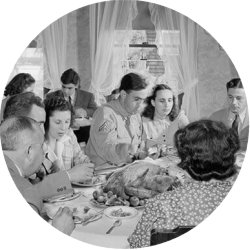 Turkey, dressing, sweet potatoes, pie. Every dish on your Thanksgiving table brings something different to the meal. Just like every member of your family brings something different to your genetic family tree. Get an idea of what DNA testing other members of your family can add to your research.
Turkey, dressing, sweet potatoes, pie. Every dish on your Thanksgiving table brings something different to the meal. Just like every member of your family brings something different to your genetic family tree. Get an idea of what DNA testing other members of your family can add to your research.
Mom/Dad:
You get half your DNA from each parent, so test them both to learn more about the half you didn’t get. Find out which ethnicity regions you did—or didn’t—inherit, divide your matches into paternal and maternal lines, and get matches you won’t by pushing your research back another generation.
Grandma/Grandpa:
Testing grandparents extends your research back two generations, and on average you inherit about 25% of your DNA from each of your four grandparents. That means their ethnicity estimates may include regions yours doesn’t, they’ll have matches you don’t, and you’ll be able to assign their matches to specific branches on your tree.
Aunts, Uncles, Cousins:
Aunts, uncles, and cousins can provide alternatives when you can’t test a more direct ancestor. You can also use them as a group to help “re-create” an older generation (see “Siblings” below) or confirm research. They’ll have matches you don’t, and you can use shared matches to help identify which branch of your tree they belong on.
Siblings:
If a parents isn’t available to test, testing all the brothers and sisters in a generation can help you re-create a good picture of their parents’ DNA profile. Sibs will differ in their ethnicity estimates (there can be bragging rights at stake here) and may have matches you don’t as well.
Guests:
Are you positive your guests aren’t actually family? It happens, and DNA can help you find out. Even if they’re notyourfamily, they’ll match somebody in the AncestryDNA database, which can get them interested in discovering their own past.
Kids:
Kids love experiments, technology, and spitting. DNA testing has all three. It’s a great way to get them interested in their own history and for you to find out what ethnic heritage they did—or didn’t—get from Mom or Dad. (Note: Tests for children under 18 must be submitted by a legal guardian.)
Courtesy of Ancestry




